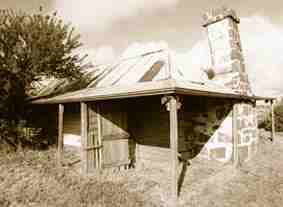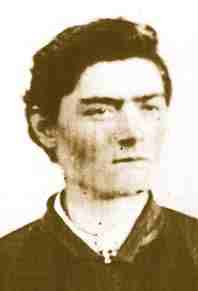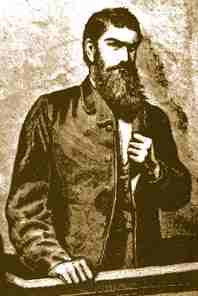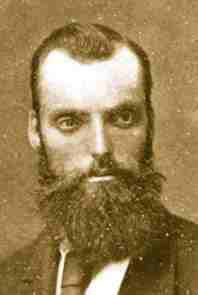|
NED KELLY - BIRTH OF AN AUSTRALIAN LEGEND
|
||||||||||||||||||||||
|
HOME | BIOLOGY | FILMS | GEOGRAPHY | HISTORY | INDEX | MUSIC | SOLAR BOATS | SPORT | SPONSORS |
||||||||||||||||||||||
|
Like most outlaws Ned Kelly died young, being only 25 when he was executed. He was expert with a “running-iron” on stolen, unbranded stock, and was a deadly accurate shot with revolver or rifle. Surprisingly articulate for a self educated man, he was clannish, loyal to his friends and supporters, and had a sardonic sense of humour. He became an outlaw, hunted for almost two years before he was shot down and hanged. To the last, his mocking courage never deserted him and to be “as game as Ned Kelly”; came to symbolise, in Australian folk-language, heroism of a reckless, audacious kind.
The Kelly cottage at Beveridge, Victoria
Ned Kelly was born at Beveridge, Victoria, in December 1854, the same year as the Eureka Stockade uprising in Ballarat. His father, John Kelly, came from Tipperary, Ireland. In 1841 John “Red” Kelly was transported to Tasmania for seven years for stealing two pigs. Having served his time, he crossed to Port Phillip, Victoria, in 1848 and two years later married a girl called Ellen Quinn from County Antrim, Ireland. The Quinns lived at Wallan Wallan, 30 miles north of Melbourne.
Two of Ellen Kelly's sisters married members of the Lloyd family and for many years the Kellys, the Quinns and the Lloyds made a formidable clan. John and Ellen Kelly had eight children: Mary, Annie, Ned, Maggie, Jim, Dan, Kate and Grace. They lived on a small dairy farm near Avenel, having moved 40 miles north of Beveridge after Ned was born. Ned attended school at Avenel. It was during his school years that Ned risked his life to save a drowning boy, Richard Shelton, who was swept off the banks of the Hughes Creek and into the raging waters.
Ned Kelly aged 15
Through it all, Ned emerges as an utterly imposing individual, as he did from the mist at Glenrowan, clad in his world–famous suit of armour, for his extraordinary ‘Last Stand’. Pro–Kelly sentiment is at an all–time high. Even before the latest spate of publicity, there were clear signs that more and more Australians felt that Ned had been given a raw deal. In 2000, a special Sixty Minutes episode revealed that 91% of people polled believed that Ned had not received a fair trial when he was sentenced to death for murder. Others go further, suggesting he was the victim of a vicious system; a young man hounded into crime and whose death fell little short of martyrdom. Even in his own brief lifetime, he became a legend.
Today, in the eyes of many, he has become Australia's foremost folk–hero and a symbol of national pride. Certainly, Ned possessed qualities that far surpassed the other bushrangers of his era. He was an expert with a “running-iron” on stolen, unbranded stock and was a deadly–accurate shot with a revolver or a rifle. Despite being a largely self–educated man, he was surprisingly articulate, boasted an almost poetic turn of phrase and a sardonic sense of humour. Ned’s family meant everything to him and he was the man of the family at the age of 12. He was fiercely loyal his friends and supporters, to the extent that he would risk his own skin to ensure the well-being of an ally.
Over the years the Kelly Gang have been the subject of numerous Books and articles; radio and Television programs; Movies and Theatre productions; and countless souvenir and consumer items. To better understand the Kelly uprising, we recommend further research starting with our book reference section. As readers we gain valuable insight into the depth of Kelly’s resolve. We need look no further than the famous exchange between Ned and his nemesis Sir Redmond Barry during the final stages of his Trial. It was here the self-important Barry, who prided himself on his eloquence and ability to match wits with the best of them, came unstuck when he initiated a courtroom exchange with a man of little formal schooling. That Ned showed Barry up for what he really was — a pompous aristocrat completely out of touch with the common man — became Ned’s final masterstroke.
WORKING IN THE BUSH
They regarded all unbranded strays as fair game and the police patrols as their natural enemies. The police in Kelly Country also bitterly resented the clannishness of the small selectors and were determined to break them. When Superintendent Nicholson, a Scot, took over the north-eastern police district, he was told that Mrs Kelly's house was a notorious meeting place for rogues and cattle-thieves. He gave Mrs Kelly a stern warning, to which she responded with a spirited retort.
In his official report, Superintendent Nicholson stated firmly, if injudiciously: “The Kelly gang must be rooted out of the neighbourhood and sent to Pentridge gaol, even on a paltry sentence. This would be a good way of taking the flashness out of them”. The forces of law had already been at work on the “Kelly Gang”, as Nicholson chose to call the family. At the age of 14, in 1869, Ned was arrested for assaulting a Chinaman. He was kept in the Benalla lockup for 10 days and then reluctantly released when the magistrate, Alfred Wyatt, dismissed the charge. A year later Ned was taken on a more serious charge, that of being an accomplice of the bushranger Harry Power. Again, the case against him was dismissed for lack of evidence.
Later, Power claimed bitterly that Ned had betrayed him for a reward which Ned hotly denied. Afterwards it was established that Jack Lloyd had been the betrayer. But the police did not relax their interest in Ned. He was jailed for six months for assaulting a hawker and in the following year, 1871, came disaster. He was sentenced to three years in Pentridge gaol for receiving a “borrowed” mare. The borrower was his friend Isiah“Wild” Wright, who inexplicably received a sentence of only 18 months.
Ned Kelly in the dock
An embittered Ned was released in 1874 and made his way home. He found that his mother had married again and her new husband, George King, was from California. He was later described by Ned as a clever horse-thief. King gave Mrs Kelly (she retained her first husband’s name) four children and then moved on. Ned had worked with him for a time, running stolen horses across the Murray River for sale in New South Wales. Brother Dan Kelly also fell foul of the law while still in his teens. He was given three months for damaging property, but later the chief police witness against him was charged with perjury. On his release from prison Dan went home unaware that the police, unable to find the horse-thief, King, had sworn warrants against both Ned and Dan. It was reported that Ned had slipped over the border into NSW, however, evidence suggests he was very close by on the night of the “Fitzpatrick Incident”.
The trooper who came with the warrant was a weak willed man named Alexander Fitzpatrick, who had called at a tavern on his way to Mrs Kelly's place to fortify his intent. He found Dan at home with Mrs Kelly and the girls, as well as Will Skillion (Maggie Kelly's husband) and a neighbouring selector named Williamson. About five minutes after the lone trooper entered the homestead violence erupted. Fitzpatrick made a drunken pass at Kate Kelly. Dan knocked him down and, in the ensuing scuffle, the trooper's gun went off and he cut his wrist, most likely on the door-latch. Mrs Kelly was full of concern. She bandaged his wrist and he was invited to have supper with the family and “let bygones be bygones”. On his way back to police barracks, Fitzpatrick had some more brandy. He then reported to his superiors that Dan Kelly had resisted arrest, and that Ned had burst into the room and shot him in the wrist. Ned then offered to cut out the bullet with a rusty razor blade but Fitzpatrick decline, opting to use his penknife to dig it out.
A doctor giving Crown evidence readily accepted the contribution of Fitzpatrick’s penknife to the injury, while apparently reluctant to state definitely that a bullet had been involved. Ned Kelly may have had a revolver at the time of the incident, but it seems highly unlikely that it produced the constable’s wound, certainly not as alleged by Fitzpatrick. Even the acting commissioner of police later admitted Fitzpatrick was “a liar”. In all likely hood both Ned and Joe was present at the Kelly homestead on the night Fitzpatrick came calling. By the time a troop of police had surrounded the Kelly homestead, the boys had gone bush. In spite of Mrs Kelly’s protests that Ned was 400 miles away and, anyway, nobody had shot Fitzpatrick, arrests were made. For assisting in the attempted murder of a police officer, Judge Redmond Barry sentenced Skillion and Williamson to six years each, and Mrs Kelly herself was sentenced to three years in gaol. Barry at the time also remarked that, “had Ned been present I would have sentenced him to twenty one years”. Later, Fitzpatrick was to be discharged ignominiously from the police force for misconduct in another case. But by then the damage had been done.
Ned Kelly swore vengeance. Restrained by his friends, he instead wrote an impassioned letter to Magistrate Wyatt, offering to surrender his own person “to any charge” in exchange for his mother, but Wyatt was powerless to act. By then the police were increasing their efforts to get Ned Kelly, so he and Dan vanished overnight from the district. The government offered a reward of £100 each for their apprehension. Ned and Dan went into hiding in the Wombat Ranges, some 20 miles from Mansfield in rough country. They cleared the ground and built a slab hut near the banks of a creek, and spent their time panning for alluvial gold.
Mc Intyre
Here they were joined by two old friends, Steve Hart a part time jockey from Wangaratta, and Joe Byrne son of a gold prospector at Beechworth. Both had previously served short prison sentences. Ned Kelly was a natural leader, but it was later revealed that he had no plans to carry out organised crimes from his hideout. The most that the four hoped to do was find a way to distill illicit liquor and then to sell it in a hope to raise enough money to mount a retrial for Ned and Dan’s mother.
The police hunt intensified. In late October 1878, Sergeant Kennedy, with Constables Lonigan, Scanlon and McIntyre, rode out from Mansfield. They wore no uniforms but all were heavily armed. On the 25th they made camp at Stringybark Creek, unaware that only a mile was the Kelly’s camp. Making one of his regular reconnoitres, Ned spotted the police camp and hurried back to raise the alarm believing, quite rightly, that he and Dan would be shot on sight. There had been recent, well-publicised cases of trigger-happy New South Wales police killing suspects and there is persuasive evidence that the Victoria police searching for the boys were equally likely to shoot first. One police officer was quoted as saying “If I come across Ned Kelly I’ll shoot him like a dog”.
Not only were the police well armed, they had also bought along a pack horse fitted with heavy leather straps, made specially for the expedition. The sole purpose of these straps was to lash tightly the bodies of Ned and Dan for their return to Mansfield. The next day, Kennedy and Scanlon rode out on patrol, leaving Lonigan and McIntyre in camp. The two troopers were relaxing by the campfire when Ned, Joe, Steve and Dan emerged silently from the bush. They challenged the troopers and ordered them to bail.
ARMOUR | JERILDERIE LETTER |KELLY COUNTRY | KELLY GANG| |VILLAINS| |ROYAL COMMISSION | TRIAL | WEAPONS
Ned Kelly Story | Kelly Family Tree | Other Bushrangers | Shopping | Kelly Country Tourism | Guestbook/Subscriptions
History
in Dispute | Accepted
History | Armour | Studying
History | Oral History Kelly Books | Matta of Opinion | Dave's Kelly News | Kelly Links
A taste for adventure capitalists
Solar Cola - a healthier alternative
|
||||||||||||||||||||||
|
This
website
is Copyright © 1999 & 2006 NJK. The bird The name '1824' is a trade mark of Solar Cola Ltd. All rights reserved. Max Energy Limited is an educational charity. |
||||||||||||||||||||||
|
AUTOMOTIVE | BLUEBIRD | ELECTRIC CARS | ELECTRIC CYCLES | SOLAR CARS |



